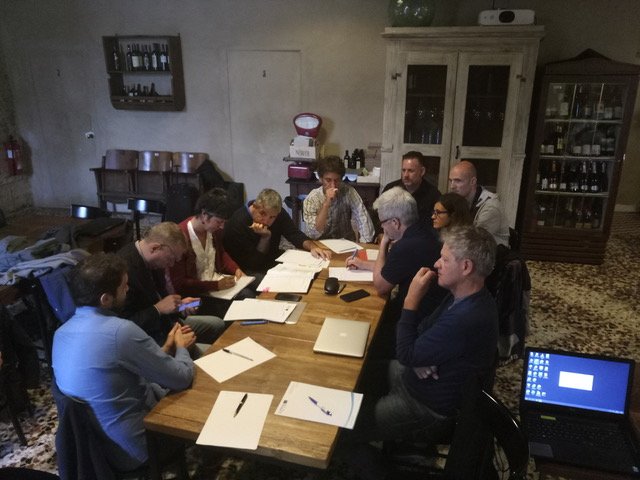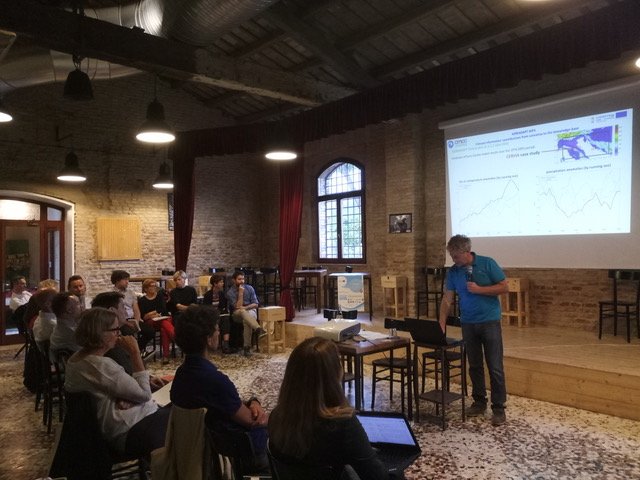
Three days of work in Cervia preparing guidance and understanding needs for urban adaptation.
ADRIADAPT partners have met in Cervia from 25 to 27 September 2019 to work on climate change adaptation. The Interreg Italy-Croatia project ADRIADAPT aims at promoting local and regional resilience by developing the knowledge base for suitable climate adaptation and planning in urban and coastal regions of Italy and Croatia along the Adriatic Sea. The meeting included work with local policy makers from Cervia and Valle del Savio, discussing their needs and expectations from scientists of the ADRIADAPT project.
Project partners were hosted by the City of Cervia, one of the five project partners coming from Italian and Croatian local authorities. Together with the scientific partners they discussed future scenarios and expected impacts for their urban areas and communities, and worked on possible models and strategies for interventions: the aim will be to create strategies and plans which will guide activities to make Adriatic cities and towns more resilient. Lessons learned during this process which will last until December 2020, will contribute to an online platform collecting guidance instruments, tools and best practice examples.
 In fact the first two days were dedicated to technical work. Exchanging knowledge and discussing specific issues related to climate change, as a preparatory work for selecting and shaping adequate tools and experiences to serve local administrations, so that they can deploy actions to defend and protect local communities from extreme events.
In fact the first two days were dedicated to technical work. Exchanging knowledge and discussing specific issues related to climate change, as a preparatory work for selecting and shaping adequate tools and experiences to serve local administrations, so that they can deploy actions to defend and protect local communities from extreme events.
This type of events is recorded with an increasing frequency, as local project partners reported, talking about a heavy storm which has seriously damaged the coastal pinewood of Cervia, and the heavy rainfall causing flooding in Valle del Savio and Cervia last spring. Also Croatian partners reported increasing frequency of short-term heavy rainfall and all coastal partners share concern about the impacts of sea level rise which do not include coastal flooding and erosion alone, but also intrusion of salt water into coastal aquifers that affects ecosystems and livelihoods. Another challenge cities will increasingly need to tackle are heat waves, which put especially elderly and very young citizens at risk.
The regional projections for the future climate provided by CMCC researchers showing that such events will become more intense in the future due to global warming, made clearer how this issue needs to be seriously faced. Therefore, the commitment of local administrations to adopt pathways to a balanced and sustainable development is crucial for creating new actions and activities which limit greenhouse gas emissions and enable, at the same time, communities, their economies, and infrastructure to withstand impact from climate change. Researchers from the ADRIADAPT project have presented actions already implemented in other cities that can improve the quality of life in local communities and households while increasing local resilience. The so-called “nature based solutions” for climate adaptation will represent an important part of the possible solutions presented to local administrations.
 These opportunities were discussed on the last day of the meeting when project partners met local policy makers to better understand local needs and constraints related to adaptation and explain how to proceed with the preparation of local climate plans and which enabling conditions need to be created. “Visions can be an important tool for creating agreement and commitment between citizens and administrations, as they allow for thinking beyond electoral periods and addressing long term changes like those triggered by climate change”, one participant said.
These opportunities were discussed on the last day of the meeting when project partners met local policy makers to better understand local needs and constraints related to adaptation and explain how to proceed with the preparation of local climate plans and which enabling conditions need to be created. “Visions can be an important tool for creating agreement and commitment between citizens and administrations, as they allow for thinking beyond electoral periods and addressing long term changes like those triggered by climate change”, one participant said.
Administrators from Cervia and Valle del Savio have participated in this round table discussion with project partners; similar events will take place, during the course of the project, in the other pilot areas of the project partners from the cities of Udine (Italy) and Vodice (Croatia) and the Croatian province of Šibenik – Knin. These cities work as partners in the project, coordinated by the CMCC Foundation – Euro-Mediterranean Center on Climate Change (CMCC) in partnership with the Regional Environment Agency of Emilia Romagna (ARPAE), and the University of Architecture of Venice (IUAV) for the Italian side. Partners from Croatia, further to the local partners, are the National Metereological and Hydrological Service (DHMZ), the Society for Sustainable Development Design (DOOR), and the Priority Actions Programme Regional Activity Centre (PAP/RAC).


